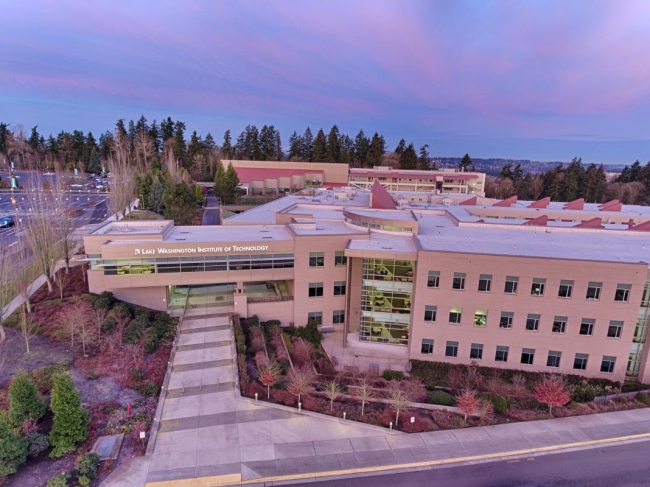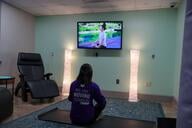You have /5 articles left.
Sign up for a free account or log in.

Lake Washington Institute of Technology
On Feb. 29, 2020, Suzanne Ames was in downtown Seattle giving a workshop at the National Community College Baccalaureate Conference. Ames is vice president of instruction at Lake Washington Institute of Technology, a public technical college about a 20-minute drive east of the city.
“Coronavirus” was, at the time, a word just starting to climb out from the back pages of newspapers. The United States, on Feb. 28, had only 64 confirmed cases of the emerging virus. But that morning, local news outlets reported that Life Care Center of Kirkland, a nursing home in the area, had two confirmed cases, with nearly 50 people experiencing symptoms. It was America’s new epicenter.
Eventually, 42 people associated with Life Care Center of Kirkland died of COVID-19. This was before all that, before masks and tests, quarantines and social distancing.
“A dean of instruction called me to tell me that we had nursing and physical therapy students and faculty at the Life Care Center for their clinicals,” Ames said. They had been there just the day before. “It became very clear that LWTech was in the heart of the epicenter.”
Shortly after, Ames got another call. A different dean had been contacted by state officials. They asked if college facilities could be commandeered to store dead bodies if necessary.
“At that point there was no mistaking that this was real.”
LWTech is very likely the first college in the country that was impacted by COVID-19. Officials, students and faculty there recount experiences that are, at this point, the norm at institutions across the country -- feelings of getting sick, of being scared, of running on empty. But there are also feelings of gratitude, of hope, acceptance and pride. This was not, by any means, a normal year.
‘Out of Control’
Ruth Gelbach, a first-year nursing student at LWTech, was at Life Care Center of Kirkland with 15 other students for her clinical course on Feb. 28. She had heard of COVID-19. Nursing students had read about it in pathophysiology. But she thought nothing of it that day at Life Care.
“We just thought there was a flu or cold virus going through the nursing home, which is not at all unusual,” she said. But near the end of the day, students were told that the nursing home was in touch with the Centers for Disease Control and Prevention.
After the news of the COVID-19 cases at Life Care Center broke, the college was left scrambling.
“It became very clear that we were alone in this. We couldn’t get officials on the phone. We couldn’t get answers. No one had answers,” Ames said. “We were in uncharted waters.” The college closed campus for two days for deep cleaning.
“This was really back when we didn’t know what quarantine meant. We didn’t have the vocabulary and the understanding of the disease that we do now. We weren’t masked,” said President Amy Morrison. “I didn’t have public health advice to give them right away.”
It took health officials three days after initial exposure to recommend that the students and faculty self-quarantine, but diagnostic tests were still hard to come by.
Gelbach began to feel symptoms and grew worried. She has asthma and is a single mom to a young son. At the time, no one knew how the virus affected children. She and her cohort entered quarantine, and the college provided them with grocery store gift cards to make up for lost wages from their outside employment. Ames and a college dean started doing contact tracing themselves.
Theresa Cadondon was in class when she began to feel symptoms of COVID-19, a high fever and body aches. She was studying physical therapy assistance and hadn’t been to Life Care. She still doesn’t know exactly how she got infected.
“I never felt this bad before,” she said.
A faculty member tested positive on March 4.
“At that point it became clear to me,” Morrison said, “this virus was out of control.”
Gelbach tested positive March 5. Cadondon tested positive March 6. Forty-five people were now in quarantine. That Friday, after a week of quick and sporadic closures, LWTech announced it was moving to online instruction. Other Washington institutions did the same.
The Year That Was
What happened next should be familiar: the college finished up the winter quarter online. Officials gave out tablets to students without computers and tied up the phone lines of technology companies, as large research universities followed close behind them.
In the spring, officials delayed the start of the quarter and announced that labs for the college’s many technical programs, such as auto work and welding, would be given in the summer. Lectures would be online. Students in the culinary and baking associate programs recorded videos themselves whisking and pouring for their assignments.
“They made the call [to be online] prior to the spring quarter, and I’m really glad the college did that,” said Andrea Westman, a professor of physical therapy and president of the faculty union. Announcing decisions well in advance allowed faculty time to prepare.
Similar to other technical and community colleges, LWTech lost 20 percent of enrolled students in the transition to online, mostly those who said that just wasn’t the experience they wanted.
“We were actually relieved it wasn’t more,” Ames said. Some programs, like digital gaming and human resources management, instead saw growth.
That summer, students like Cadondon raced through their labs.
“We had to learn all the [physical therapy] techniques in a short amount of time. I’m grateful that we had that time to do that, but it was so fast,” she said.
Like many institutions, LWTech made cuts. Some facilities workers and librarians, whose work had now become less pertinent, were laid off or furloughed in the spring. Then came voluntary separations and early retirement incentives. In September, anticipating difficult news from the Legislature, the college made a 7 percent budget cut, affecting 15 more staff positions. Over all, the college has seen a 15 percent enrollment drop, one that’s even larger for students of color.
By this fall, LWTech had settled into a new normal. All classes are now hybrid, with hands-on activities in person and lectures online. While some students have struggled with the new format, others have thrived. The early childhood education program, now totally online, has so far seen increased enrollment and engagement from students, most of whom are adults working in childcare centers.
Officials are considering keeping some of that flexibility in the future. Westman, the physical therapy professor, said her students have actually improved at mastering some tough topics, since they now have to listen to her lectures before meeting with her.
“We’ll never give up on our learning signature of hands-on learning,” said Ames, “but I do think the old model of coming to class five days a week is over for many programs in the future.”
LWTech officials say they’re committed to shepherding their students through the remainder of the pandemic. There are bright spots still ahead. Last March, for example, the physical therapy assistant program had to cancel its “pinning ceremony,” where students graduating in the winter quarter get their certificates, invite their families and say goodbye to their professors.
“We never really got to send them off,” Westman said. “I didn’t even see them face-to-face because they were just uploading videos.”
This year, while there will be no gathering or hors d'oeuvres, there will be an official ceremony online.
The college is beginning to think about bringing back some of the librarians and front-line staff who were let go when everything began. Classes where Black and Indigenous students and other people of color or students with disabilities are struggling will be the first to come back to in-person, officials said.
Gelbach, the nursing student, said the pandemic has strengthened her resolve to be in health care. She’s worked as a nursing assistant for 13 years and currently works on a COVID-19 floor.
Officials at the college said the experience made them more grateful for their colleagues, faculty and the resilience of their students.
“It has been the most challenging year of my career. I have found myself needing to answer questions that there are no answers to,” Ames said. “And yet through it all, I have the most phenomenal instructional team.”
Morrison echoed the sentiment.
“Twenty twenty was an incredibly humbling year. And one of which I am incredibly grateful for,” she said. “I’m very grateful that the college hung in there together and to have the foresight to realize that we were the first, but we were not going to be the last college community impacted by COVID.”








